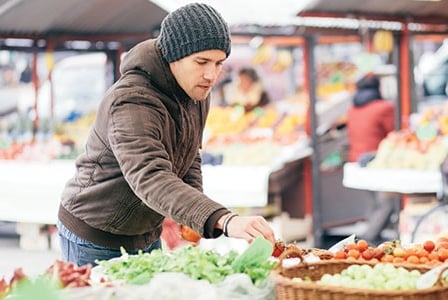
Take the 30-day vegan challenge! Learn how to eat vegan while maintaining all the nutrients your body needs.
In 1944, Donald Watson chose “vegan” to describe a growing social movement in Britain. With events such as November’s World Vegan Month taking place across the globe today, the term has become more widespread than he may have ever imagined.
What is veganism?
People often define veganism by what it forbids: no animal products and nothing processed with animal products. This means bypassing obvious foods such as meat and dairy, but it also includes obscure items such as refined cane sugar—bone char is often used during the sugar refining process.
However, veganism is more about the endless possibilities than the few restrictions. Seventy years ago, Watson wrote that he wanted a term that conveyed that “even with all animal foods taboo, nature still offers us a bewildering assortment from which to choose.”
Today, quickly scroll through social media’s vegan-related hashtags or browse through a bookstore’s cookbook section to reveal mouth-watering vegan dishes for every season and setting, proving meat and other animal products aren’t needed for a satisfying meal.
The first shopping trip
When we change our eating habits, the grocery store can suddenly feel alien to us. Having a game plan makes the transition more manageable.
“Stick to the outer area of the store where the fresh produce, nuts, and grains are located,” advises nutritionist Margaux Rathbun. “This is also where the bulk bins are placed, and I encourage new vegans to stock up on dried beans, rice, nuts, and lentils.”
Let colours lead the way in the produce aisle. The colourful rainbow of foods that you’ll choose as a result will offer a wide variety of palate-pleasing textures and flavours—and an equally wide variety of key nutrients.
Aim for nine to 12 total servings of fruit and veggies per day, so shop accordingly. While that number may seem daunting, it can actually be easier than you think. After all, a single serving of vegetables is as little as four Brussels sprouts, 1 cup (250 mL) of loosely packed kale, or 1/2 cup (125 mL) of vegetable juice.
Then, head to the refrigerated section and the rest of the store for nut butters, nut milks, and seasonings. All of these foods are important for a healthy, balanced vegan diet. Keeping such ingredients on hand means you’ll always be able to whip up a delicious plant-based meal.
The first mouthful
“Take baby steps,” recommends nutrition coach Denise DeMaras. “Focus on increasing vegetables, beans, and grains with the most protein.” Examples include chickpeas and cashews.
As you increase your plant intake, phase out animal products until you’ve made the switch completely. “Increasing vegetables may disturb your digestion,” says DeMaras, “though probably for the better. Keep a journal to discover the foods that ‘agree’ or not with you.”
While stores offer many vegan convenience foods—including soy cheese, veggie dogs, and many other options—these sometimes have the same bad health rap as traditional convenience foods. Unfortunately, some of these products are made with questionable ingredients. For example, one report found that toxic hexane was used to make some popular convenience foods.
Instead of relying on prepackaged fare, emphasize whole foods and enjoy convenience foods in moderation. After all, there’s no better way to know exactly what goes into your meals!
Filling the gaps
Vegan diets offer many benefits. For example, a review of 87 studies found that eating vegan was highly effective for weight loss. Vegan diets have also been linked to a reduced risk of heart disease, diabetes, high blood pressure, and some cancers. But no eating plan is foolproof, and new vegans should be aware of a few nutritional gaps in their eating plan.
Vitamin B12 is one of the most commonly cited examples, as it’s typically found in meat. “The only plant-based sources of this vital nutrient are nutritional yeast and some sea vegetables,” says nutrition counsellor Natasha Uspensky. “The best source, however, is in supplement form. I recommend all vegans supplement with a high quality B-complex vitamin.”
Protein can also be tricky. Since protein is important for building muscle, keeping blood cells healthy, and other vital functions, make sure to include protein-rich foods such as dried beans, lentils, peas, and soy and soy products in meals.
Some other common nutritional gaps include vitamin D, calcium, omega-3s, and iron, since most food sources for these nutrients are animal derived. Check out the sidebar “Super supplements” (below) for easy ways to make sure you get enough.
Enjoy the ride
Trying a vegan diet, even just for a month or two, can be a big undertaking. Strive for progress, not perfection. “Rome wasn’t built in a day, and finding what works for you on a healthy, balanced vegan diet takes time,” says nutritionist Carolyn Scott-Hamilton. “Experiment with different recipes and alternatives when beginning your journey.”
And don’t forget to turn to other vegans for inspiration and support. “Get to know your vegan community,” says Scott-Hamilton. “Support is great when starting your green journey and it’s so much fun to dine with your new crew, as well as share recipes, tips, and experiences.”
Take the green challenge
Each November, the Vegan Society encourages prospective vegans to embrace an animal-free lifestyle. Participants can share stories, swap recipes, and connect with other like-minded individuals on the Vegan Society’s website.
This month, take the Vegan Society’s 30-day pledge at vegansociety.com and give veganism a try!
Super Supplements
Take your vegan diet to the next level with these smart supplement choices.
Vitamin D
Most people get their vitamin D through fish and fortified dairy. Vegan options include fortified nut milks or a vegan multivitamin.
Omega-3s
The majority of Canadians, not just vegans, don’t get enough omega-3 fatty acids. A flax or soybean oil supplement can help.
Iron
Plant sources, according to Dr. Arielle Levitan, include kale and spinach. “All iron sources are best paired with vitamin C for good absorption,” she says. She warns that you would need to eat large quantities of these foods to get enough iron, and recommends a multivitamin as a more convenient option.
Calcium
Some vegans may struggle to replace the calcium found in dairy products. Fortified plant milks and dark green leafy vegetables can help, but a calcium supplement may be your most convenient option.



